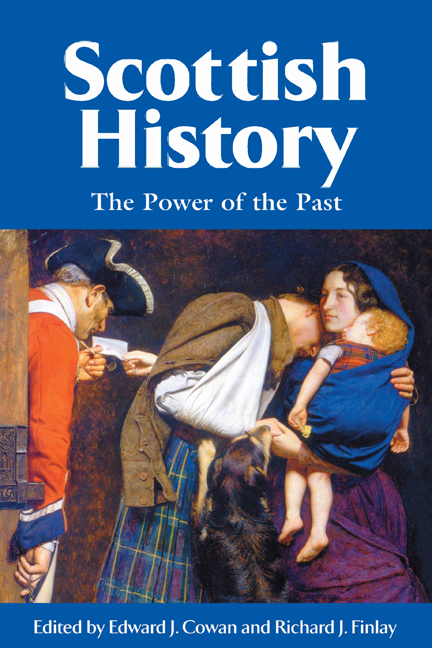Book contents
- Frontmatter
- Contents
- Contributors
- Introduction
- 1 The Picts‘ Place in the Kingship's Past Before John of Fordun
- 2 The Demonisation of King John
- 3 Late Medieval Scotland and the Matter of Britain
- 4 In Search of the Scottish Reformation
- 5 Civil Society and the Celts: Hector Boece, George Buchanan and the Ancient Scottish Past
- 6 The Covenanting Tradition in Scottish History
- 7 ‘What's in a Name?’: Pedigree and Propaganda in Seventeenth-Century Scotland
- 8 The Ideological Uses of the Picts, 1707-c.1990
- 9 The Jacobite Cult
- 10 Queen Victoria and the Cult of Scottish Monarchy
- 11 ‘Their Laurels Wither'd, and their Name Forgot’: Women and the Scottish Radical Tradition
- 12 Tomorrow's Ancestors: Nationalism, Identity and History
- Index
6 - The Covenanting Tradition in Scottish History
Published online by Cambridge University Press: 24 September 2020
- Frontmatter
- Contents
- Contributors
- Introduction
- 1 The Picts‘ Place in the Kingship's Past Before John of Fordun
- 2 The Demonisation of King John
- 3 Late Medieval Scotland and the Matter of Britain
- 4 In Search of the Scottish Reformation
- 5 Civil Society and the Celts: Hector Boece, George Buchanan and the Ancient Scottish Past
- 6 The Covenanting Tradition in Scottish History
- 7 ‘What's in a Name?’: Pedigree and Propaganda in Seventeenth-Century Scotland
- 8 The Ideological Uses of the Picts, 1707-c.1990
- 9 The Jacobite Cult
- 10 Queen Victoria and the Cult of Scottish Monarchy
- 11 ‘Their Laurels Wither'd, and their Name Forgot’: Women and the Scottish Radical Tradition
- 12 Tomorrow's Ancestors: Nationalism, Identity and History
- Index
Summary
The Solemn League and Covenant
Now brings a smile, now brings a tear.
But sacred Freedom, too, was theirs;
If thou’rt a slave, indulge thy sneer.
Robert BurnsLet us grapple with that grizzly
monster, Covenanting Tradition.
Mark NapierBurns’ sentimental if self-righteous puff on one of the covenants reflects a superficial reading of history while demonstrating the bard at half- cock, composing for the next drink. But as one who spent his life in the counties of Ayr and Dumfries he could not ignore their legacy or their lore while basically finding himself out of sympathy with both. He would have concurred with the judgement of Mark Napier, sheriff of Dumfries, on the monstrous nature of the covenanting tradition.
The National Covenant of February 1638 and The Solemn League and Covenant of October 1643, though imperfectly understood, have both proved capable of generating extreme responses for three and a half centuries. They have spawned a substantial, if surprisingly unhelpful, literature largely manufactured by worthy ministers more concerned with revelation than with history. Yet Scottish historians have been oddly reluctant to confront the essential ideas behind, and implicit in, the covenants themselves while also ignoring their lingering influence in subsequent generations. Furthermore they have singularly failed to investigate what might be termed the covenanting mythos, particularly that of the notorious ‘Killing Times’ of the 1680s which would eventually embody a corpus of Lowland tradition embracing heroism, atrocity and sacrifice, arguably the only such body of legend and tradition to rival that of the Jacobites or the Highland Clearances and, since equally rooted in orality rather than literacy, just as resistant to proof or disproof.
The covenants are unique to Scotland, structurally arising out of Scottish society. They are not to be written off in some modern faddish way, as the relics of long-forgotten religious controversy. Scottish adherents subscribed to the idea of the double covenant; they advocated a covenant to reform and safeguard the kirk as well as one for the protection and reformation of society. There was a covenant between God and his people and another between God, the king and his people, the one religious and the other constitutional. From at least the time of Andrew Melville the idea of the Two Kingdoms was central to Protestant Scottish political and religious thinking.
- Type
- Chapter
- Information
- Scottish HistoryThe Power of the Past, pp. 121 - 146Publisher: Edinburgh University PressPrint publication year: 2020



